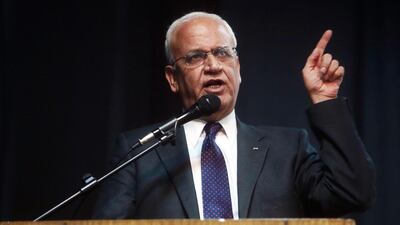Saeb Erekat, the secretary general of the Palestine Liberation Organisation who died on Tuesday, burst on to the international media scene three decades ago on prime-time American news.
At the height of the First Intifada in 1989, ABC Nightline ran a series of debates and reports on the conflict between Palestinians and Israelis.
Host Ted Koppel, a veteran journalist and son of German Jews who fled Adolf Hitler, gave the Palestinians a significant part of the three-hour series to explain their point of view.
Erekat, who was then in his mid-30s, was the youngest member of a Palestinian panel that debated with Israeli figures at a packed Henry Crown Symphony Hall in Jerusalem.
He was also, by far, the least composed.
Next to him was Haidar Abdel Shafi, the late Palestinian statesman and a model of decorum and eloquence, and Hanan Ashrawi, a savvy communicator on TV and his colleague until the end of his life.
It was a historic opportunity to address the US public directly and capitalise on the non-violence that marked the first Palestinian Intifada.
Abdel Shafi and Ms Ashrawi scored points with the sceptical audience, only to be undermined by the outbursts from Erekat, who had a PhD from Britain and came from a district on the outskirts of Jerusalem.
The nerves he clearly felt during the debates followed him into his political career, but his first impressions did not prevent him from becoming a fixture of on-and-off peace negotiations with Israel.
Nor did they stop him becoming – to many around the world at least – the face of those Palestinian negotiations.

















His lack of composure did not hinder his rise to the top of the PLO as its secretary general and did not stop him being a stalwart voice calling clearly for a two-state solution and a viable, independent Palestinian nation.
This year, Erekat summed up the convoluted and complex decades-long Palestinian struggle for freedom in stark and simple terms.
"It's our inalienable, sacred, long overdue and internationally recognised right to be free," he told The National as he laid out the Palestinian rejection of US President Donald Trump's new roadmap to peace.
“Our right to self-determination has been systematically denied by Israel, now with the support of the US.
“It is not news for us that the efforts of the Trump team are not in the direction of an independent, sovereign and contiguous state of Palestine, but towards that of normalisation of the Israeli colonial occupation over the land and people of Palestine."
Erekat was at the heart of the framework of deals that started the Palestinian peace process, starting as deputy to Abdel Shafi in the talks that led Yitzhak Rabin, Yasser Arafat and Bill Clinton to meet at the White House in 1994 to sign the first Oslo Accords.
As Abdel Shafi cautioned that the deals paid only lip service to Palestinian rights while making the PLO and the Palestinian Authority dependent on co-operation with Israel, Erekat pushed on and led the Palestinian delegation from 1996.
He worked for years to further the path of dialogue, even at times when it seemed remote.
In the Palestine Papers, leaked documents mainly from his own office that chronicled the workings of the negotiations with Israel from the late 1990s until 2010, he came across as an affable, self-deprecating negotiator.
Despite criticism from Palestinian colleagues that he was weak, he appeared to have recognised the power of Israel without ever being intimidated by it.
But the early momentum Erekat helped to create in the 1990s faded and entrenched positions, including his own, became harder to break.
In Palestinian politics, his career charted the course of the PLO from armed group to political party, but also its course from radical leftist struggle to its contemporary moribund, sickly fixture.
A close ally of Arafat, Erekat clashed with current President Mahmoud Abbas when the elder leader of the Palestinians yielded to pressure to appoint a prime minister with real powers in 2003.
He ultimately kept his place after Arafat died a year later, and remained central to Palestinian politics.


















But that placed Erekat in a leadership that many Palestinians blame for failures to protect their rights or achieve peace.
That leadership was also accused of being nepotistic, corrupt and ageing.
After his early clashes with Mr Abbas, Erekat helped the Palestinian president to rule for more than a decade without elections, and monopolised the voice of the cause.
While he was a knowledgeable and passionate champion of the Palestinian cause, he ultimately became part of an elite presiding over the Palestinian malaise, and passed without seeing the national rights he had given so much of his life trying to obtain.

